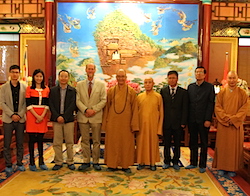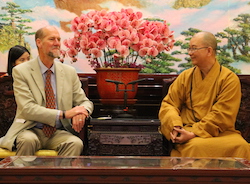| |
|
 |
Environment is critically important: Buddhist Association of China
October 16, 2015:
The President of the Buddhist Association of China, and one of the most beloved Buddhist monks in China, Master Xuecheng, has confirmed his interest in working with fellow Buddhists on practical actions to improve the environment.
"Chinese Buddhists and Buddhist followers have always paid a great deal of attention to conservation,” Master Xuecheng said. “Buddhism sees that all living things are equal...only when we protect all species, we can protect biodiversity.”
He said that environmental protection is a global issue. And that environmental pollution is an enormous issue of concern for Buddhism.
He made this statement (issued on their website) last week during a landmark visit to the headquarters of the Buddhist Association of China by head of the Alliance of Religions and Conservation, Martin Palmer.
 |
 |
 |
Buddhist Association of China and ARC meeting in Beijing |
The Chinese Buddhist community has reinforced the Buddhist position on conservation through issuing a powerful statement on "protecting life with compassion" and "sensible mercy-release” of animals and wildlife.
This is the first time the new leadership has set out clearly the importance of environmental protection to the Buddhist Association of China, signaling a real desire to become active in this field, and building on their powerful statement on the illegal wildlife trade which they made last year.
“Master Xuecheng is renowned for the hundreds of young volunteers who have worked with him at his monastery on environmental projects,” said Martin Palmer.
 |
 |
 |
Master Xuecheng and Martin Palmer |
“He brings to the Buddhist Association of China not just a theoretical, spiritual and philosophical approach but also a hands on approach to conservation.”
The Chinese Buddhist Statement on Wildlife“The Buddha’s nature is in all living things. The lives of animals are just as precious as those of humans. Malicious killing will bring bad karma. Buddhism teaches that ‘all living things in the Six Realms of Samsara are my father and mother”, therefore all Buddhist followers should love and protect all lives with gratefulness and compassion -- ‘if you see people killing an animal, you should try to save the animal and shelter it from suffering’.
Therefore, Buddhism considers killing as the worst crime, no-killing is its first precept, and protecting lives with compassion is a great accomplishment…..we call upon all Buddhists around the country in their daily life to always live with compassion, to refrain from killing and to protect lives; to obey rules and laws on wildlife protection, to refrain from participating in any killing or trade of wildlife; to refuse to buy and use wildlife products such as ivory and rhino horns; to actively inform law-enforcement or conservation organizations on activities involving killing or trade of wildlife; to help save those wild animals captured illegally; to encourage those who are available to participate in animal conservation NGOs or support wildlife projects.
We also call on Buddhist temples to advertise in different forms the ban against killing, a vow to protect life, to encourage a healthy vegetarian diet and to persuade people to protect life with compassion…”
LinksLink here for more details of the China Buddhist wildlife killing ban.
|
 |
 |
|
|
|
|
|

